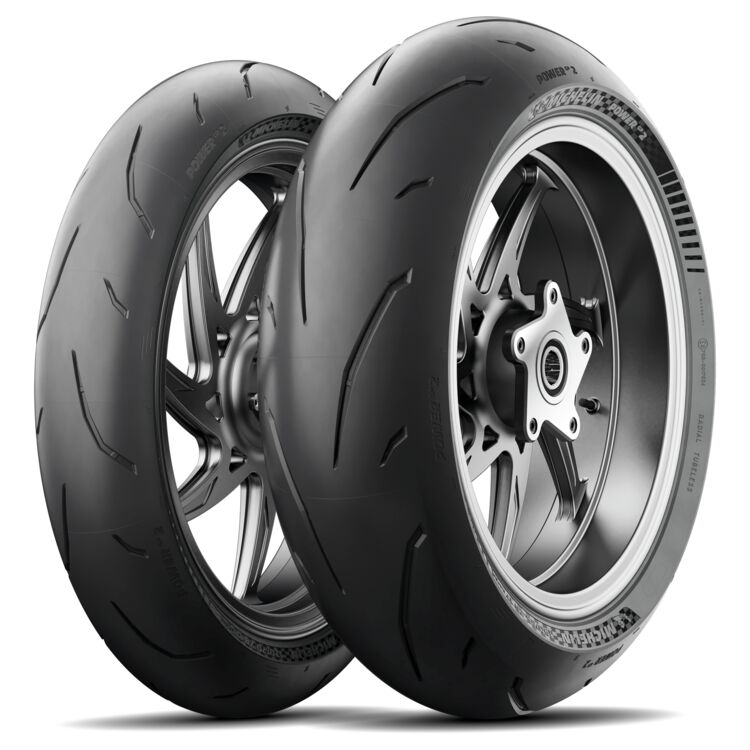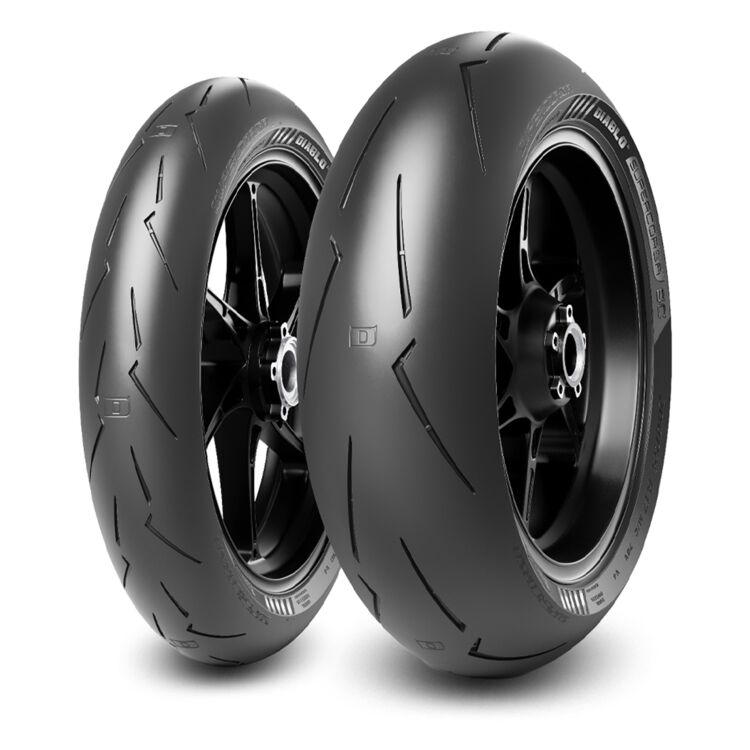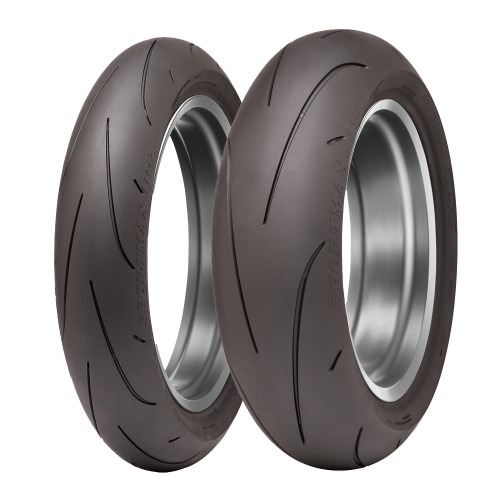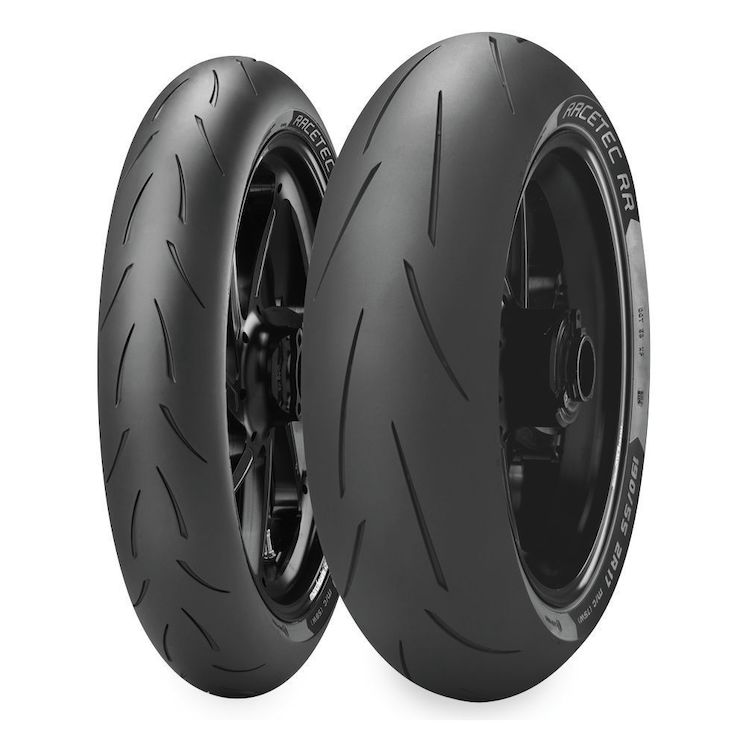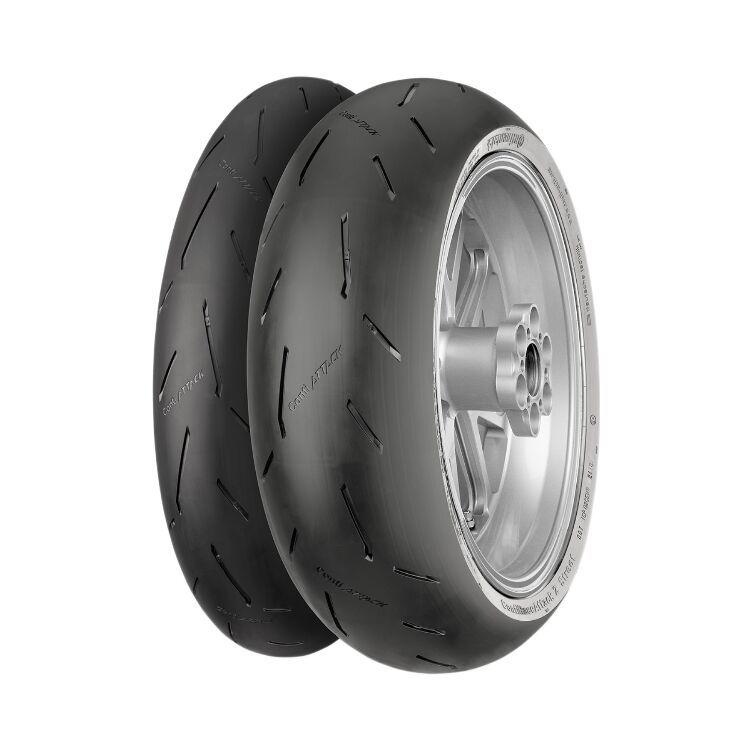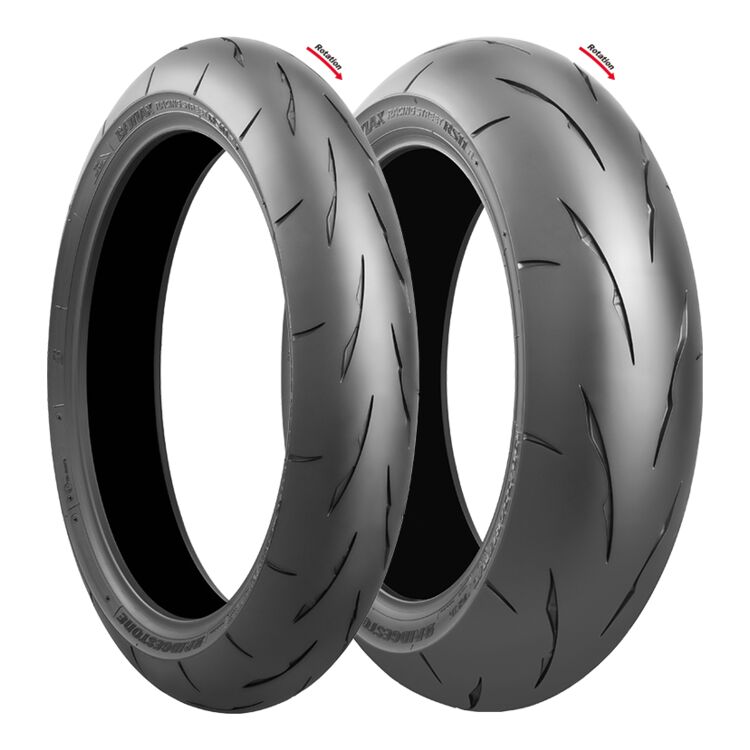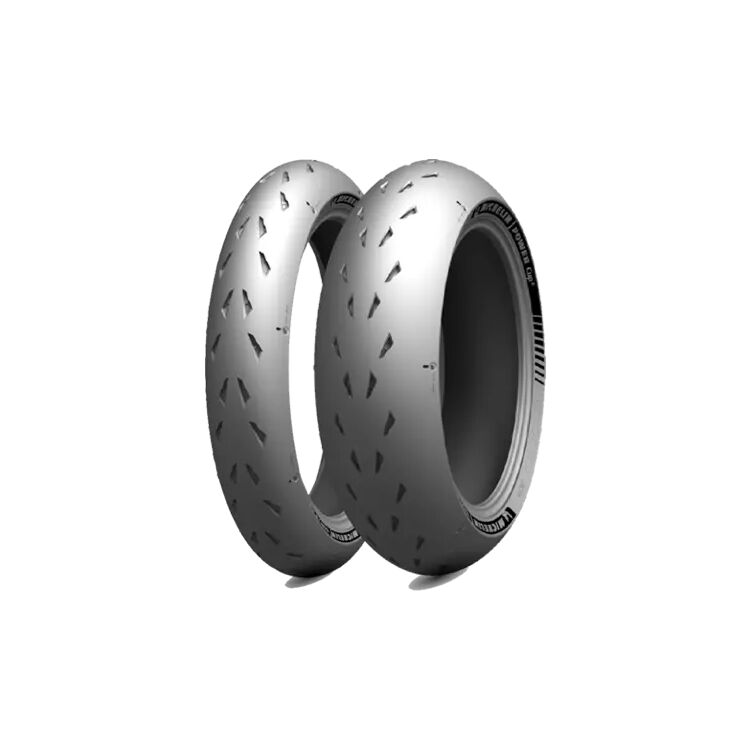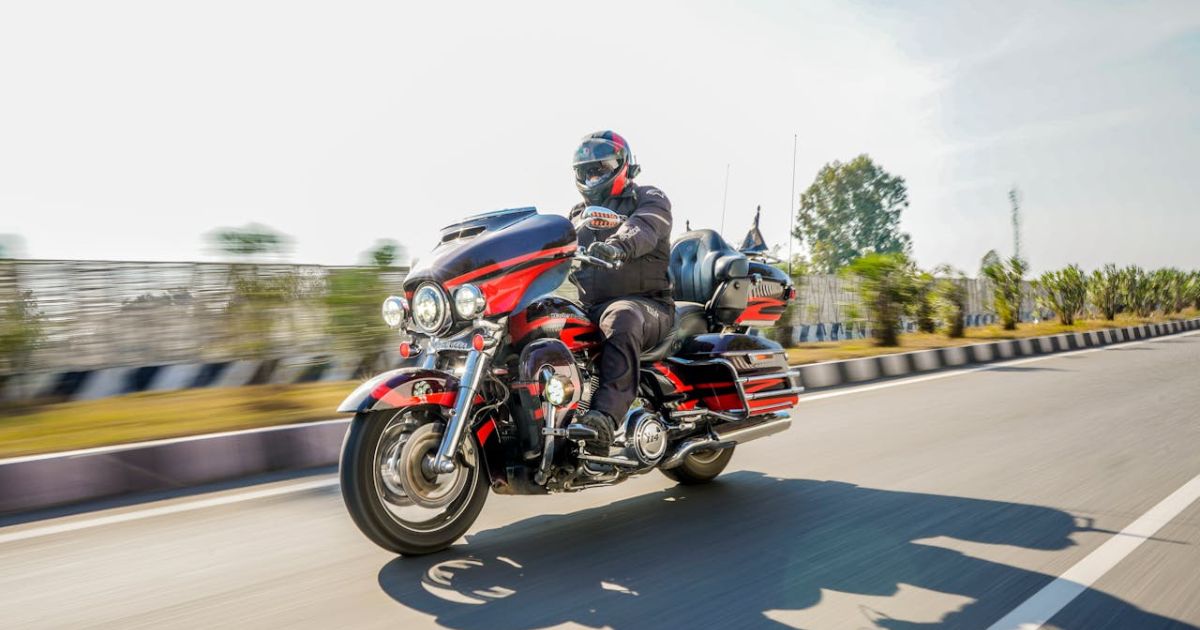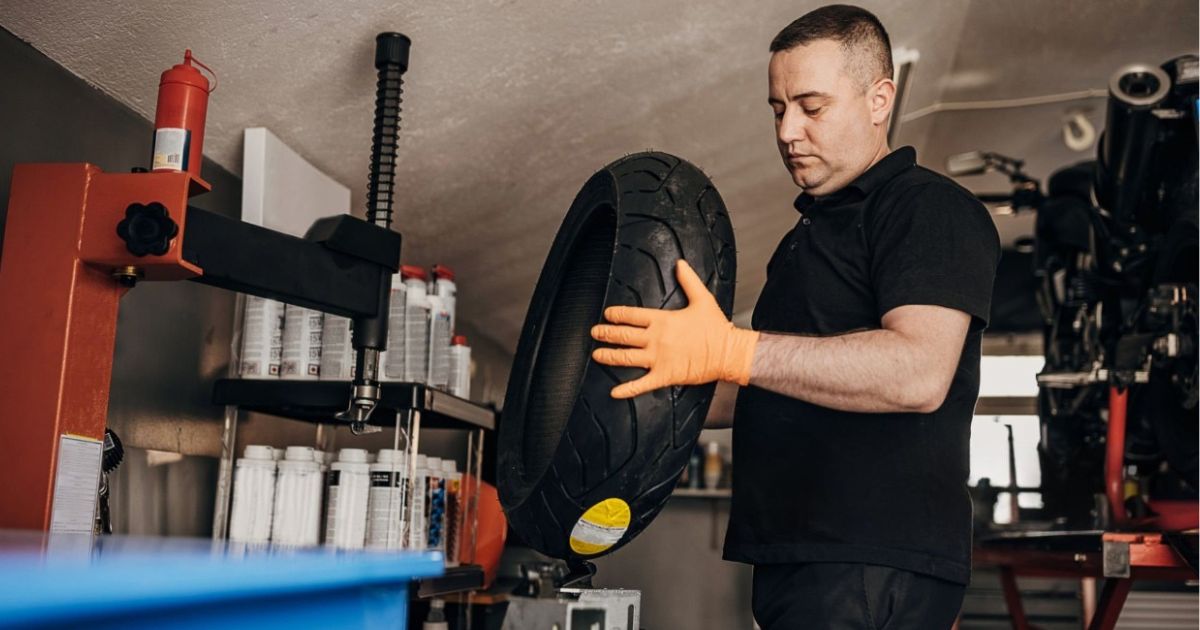
Best Motorcycle Track Tires 2025: Ride Fast, Ride Smart
left for contents
When you head to a track day, nothing matters more than your connection to the asphalt. As riders we obsess over brake pads and horsepower, but the rubber determines whether you stick the apex or slide into the grass. Choosing the wrong tire can mean spending half the day in the pits, cooking your tires on warmers or adjusting air pressures, instead of hustling out of corners.
The right track tire feels like cheating – you can lean harder, brake later and flick into turns with ease. It’s also the difference between riding to the circuit confidently or hiring a truck because your rubber isn’t road‑legal.
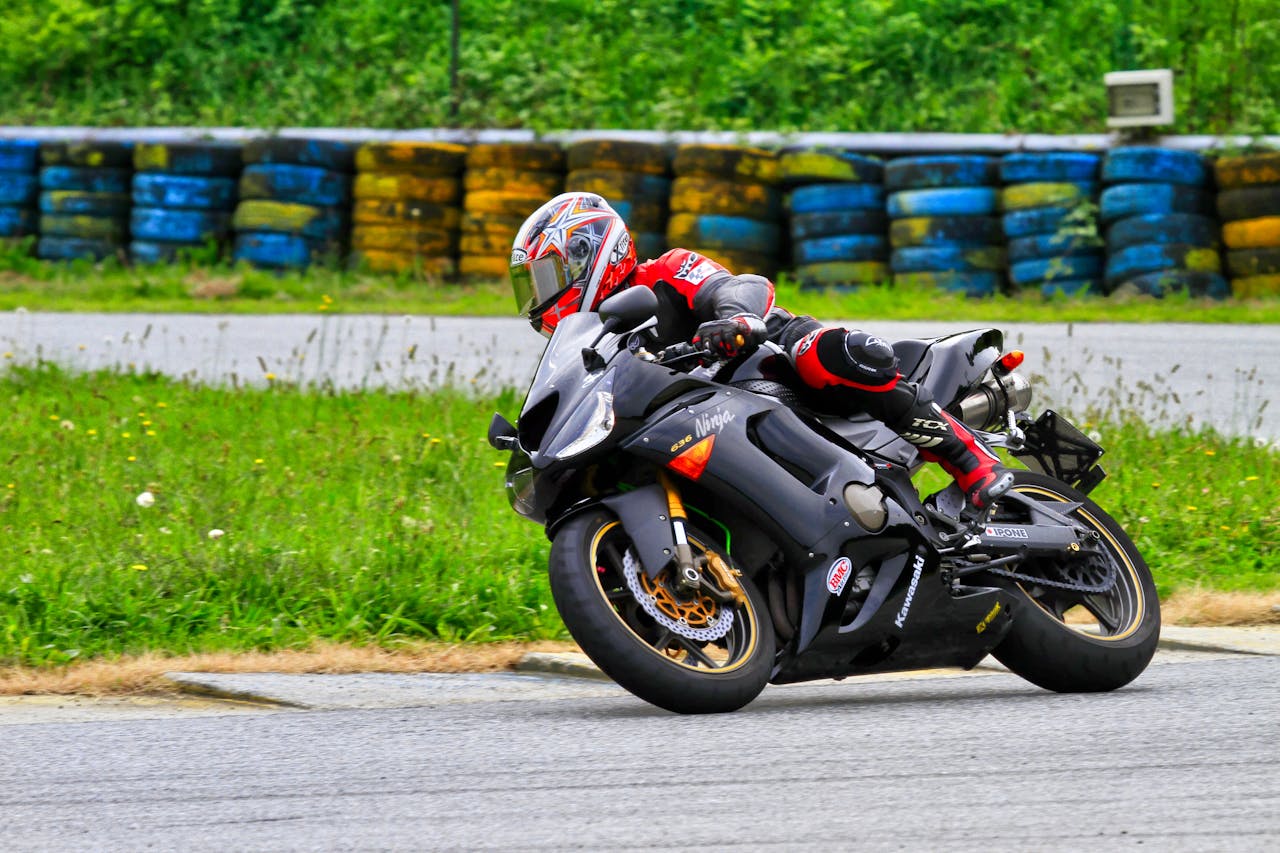
Before we dive in, here are a few truths that might surprise you:
- Street‑legal track tires aren’t always slower than slicks. Modern compounds like Michelin’s ACT+ and Bridgestone’s 3LC give you race‑tire grip without sacrificing tread life.
- Warm‑up time can be more important than outright grip. A tire that comes in quickly (like Dunlop’s Q5S) lets you roll straight out of the paddock at pace, while some race replicas need heat to work.
- Not all track tires love the same bikes. Liter‑bike riders need robust carcasses and dual compounds (think Michelin Power Cup 2), while middle‑weight machines often respond better to more flexible constructions like Continental’s Race Attack 2.
- Budget plays a role, but cheaping out costs more in the long run. Worn‑out or under‑specced tires overheat faster and wear poorly; you’ll replace them sooner and risk crashing.
To cut through the noise, we’ve highlighted our Top 3 track tire picks—each the best in its class for versatility, pure race feel, and easy street-to-track grip.
Quick warm-up, durable dual-compound, and MotoGP tech make it the most versatile choice for riders who split time between road and circuit. | WorldSBK-derived construction and razor-sharp feedback give near-race performance while staying DOT-legal. | Slick-like performance with easy setup, fast warm-up, and strong street manners—ideal for riders who want track grip without the hassle. |
|
|
|
|
|
|
Quick warm-up, durable dual-compound, and MotoGP tech make it the most versatile choice for riders who split time between road and circuit.
- Fast warm-up even from cold
- Sharp turn-in & high edge grip
- Stable under braking & acceleration
- Durable center compound for street reuse
- Slightly stiff ride on rough streets
- Less confident in cold or wet low-temp conditions
WorldSBK-derived construction and razor-sharp feedback give near-race performance while staying DOT-legal.
- Quick warm-up, ready in one lap
- WorldSBK-derived feel and edge grip
- Stable even under hard braking
- Consistent grip across heat cycles
- Less confident in cold or wet weather
- Tread life drops under aggressive use
Slick-like performance with easy setup, fast warm-up, and strong street manners—ideal for riders who want track grip without the hassle.
- Fast warm-up, ready after one lap
- Strong, predictable edge grip at lean
- Good dual-use: track performance plus street durability
- Grip remains consistent even after heavy use
- Rear may degrade in long, hot sessions
- Less confident on cold or wet surfaces
Which Tire Fits Your Riding?
Before picking your rubber, consider your bike, your riding style and how much road mileage you’ll rack up between track days. Here’s a quick breakdown:
| Riding Scenario | Tire Traits to Look For | Suggested Models |
|---|---|---|
| Track + Street commuter | Fast warm‑up, DOT approval, durable compound that works in cooler temps | Michelin Power GP 2, Dunlop Q5S |
| Intermediate track racer | High grip at lean, stable carcass, slick‑like shoulders | Pirelli Diablo Supercorsa SP V4, Continental Race Attack 2 |
| Liter‑bike or open‑class machine | Robust dual‑compound with stiff casing, short warm‑up but designed for big power | Michelin Power Cup 2, Bridgestone Battlax RS11 |
| All‑weather track day | Broad temperature window, predictable feedback, versatile compound | Metzeler Racetec RR K3, Continental Race Attack 2 |
Use this table as a starting point. Keep reading for detailed stories on each tire and how they transform your ride.
Michelin Power GP 2 – The Road‑And‑Track Champ
Best for riders who split their time 50/50 between the street and circuit.
Michelin’s Power GP 2 is a purpose‑built hypersport tire designed to heat quickly and deliver confident grip on road or track. The French brand drew on MotoGP™ technology and 500+ FIM victories to refine the dual‑compound mix and carcass profile. The result is a tire that behaves like a race slick on warm asphalt yet remains civil on the ride home.
Why it’s special
- Balanced 50/50 design. The GP 2 uses a dual‑compound structure with a softer shoulder and harder center. On track it feels glued at full lean, and on the street the harder strip preserves mileage.
- Quick warm‑up, no warmers required. Many track tires demand heaters to reach optimum temperature; the GP 2 gets sticky within a lap. This saves time and lets riders roll straight into a session.
- High‑speed stability and longevity. It’s (W)‑rated for speeds over 168 mph and engineered with Michelin’s MotoGP expertise, so it stays composed during fast sweepers and resists tearing.
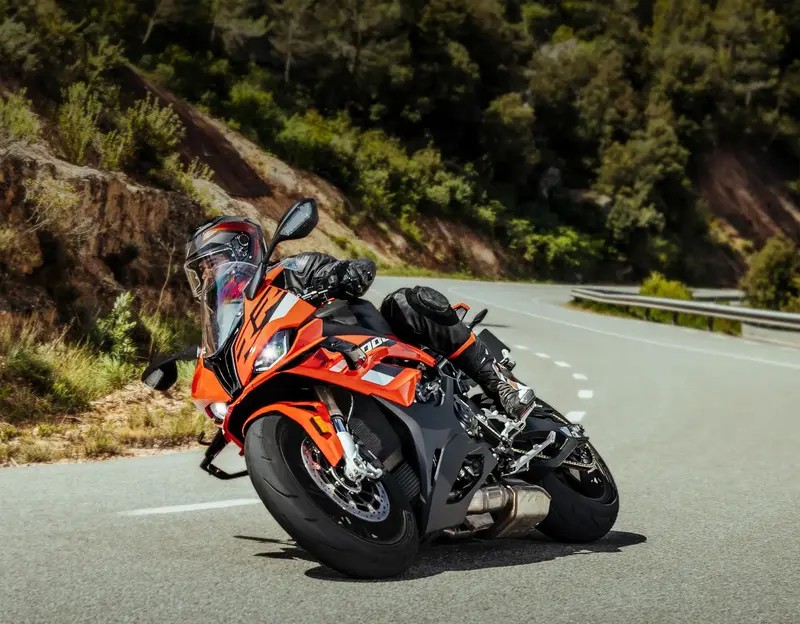
What you might not like
- Temperature sensitivity. On cold mornings or damp roads the GP 2’s racing compound struggles to build heat quickly. That’s the trade‑off for its track performance. Silver lining: the stiffer carcass means you still get predictable feedback even when grip drops.
- Not as plush as a sport‑touring tire. The stiff construction gives great stability but transmits more road imperfections. If comfort is key, consider a sport‑touring option like the Michelin Road 6 (we cover it in our Best Motorcycle Tires for Street, ADV and Dirt guide).
A 50/50 road-and-track hypersport tire that heats quickly, delivers sharp feedback, and holds strong on the edge without needing warmers.
- Fast warm-up even from cold
- Sharp turn-in & high edge grip
- Stable under braking & acceleration
- Durable center compound for street reuse
- Slightly stiff ride on rough streets
- Less confident in cold or wet low-temp conditions
Verdict
For riders who enjoy spirited canyon carving yet don’t want to sacrifice track performance, the Power GP 2 hits the sweet spot. It’s confidence‑inspiring, durable and you won’t need a van to get to the circuit.
Pirelli Diablo Supercorsa SP V4 – Race Feel for the Road
Best for aggressive riders chasing lap times who still need a DOT‑compliant tire.
Pirelli’s Diablo Supercorsa SP line has long been the benchmark for “race replicas.” The fourth‑generation SP V4 is built from the ground up with profiles, structures and compounds pulled directly from World SBK competition. Imagine having a set of race tires with just enough grooves to keep the police happy.
Why it’s special
- World SBK construction. Compounds and profiles come straight from the FIM Superbike Championship. You’re essentially riding on the same rubber as pro racers.
- FLASH grooves and optimized contact patch. The minimal tread pattern is designed for homogeneous thrust and consistent performance at any lean angle. The contact patch stays large as you lean, giving you insane edge grip.
- Racing compound shoulders. The shoulders use a pure racing compound while the central band uses a slick road compound. This dual nature means the tire warms quickly and stays stable down the straights.
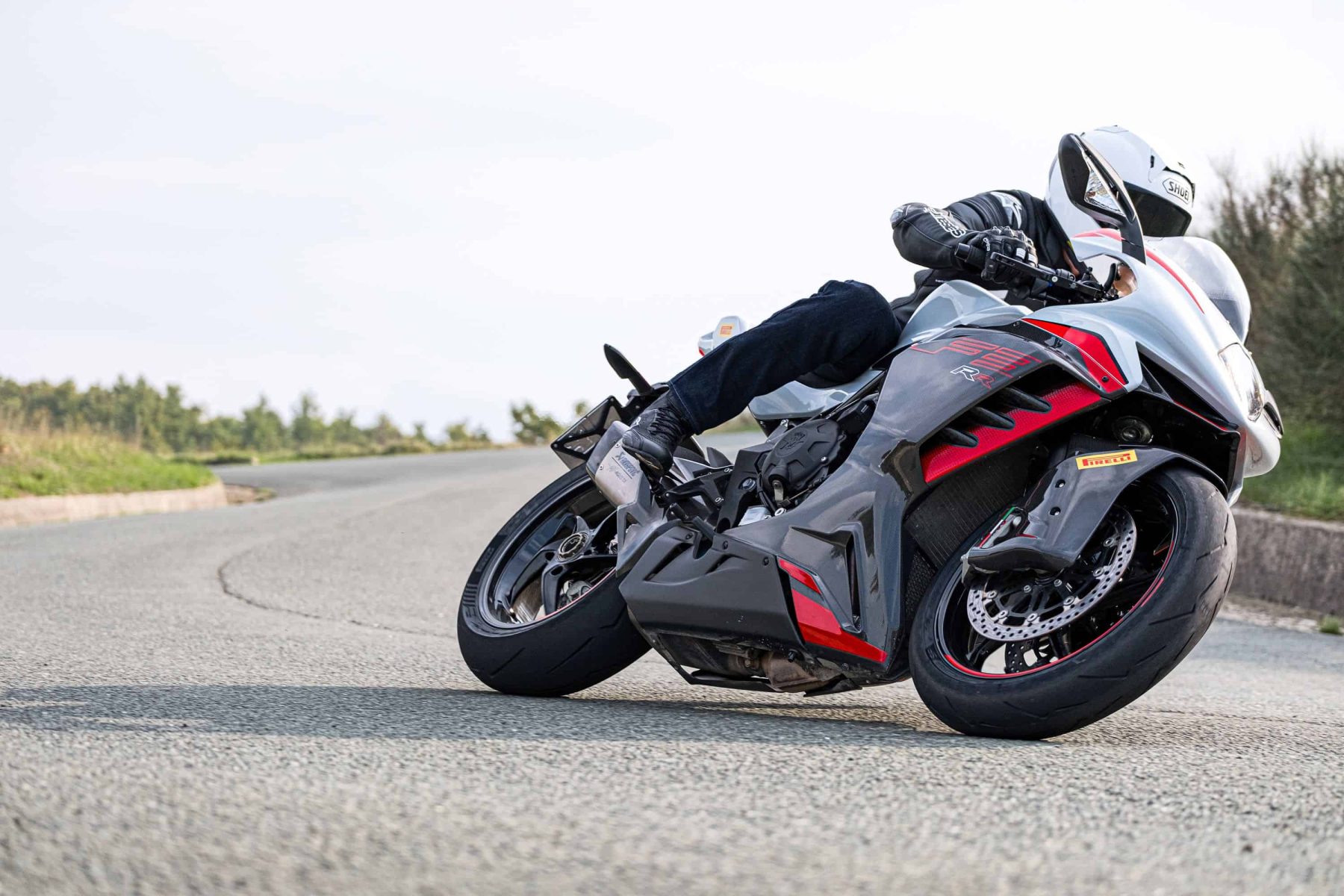
What you might not like
- Requires commitment. The Supercorsa SP V4 delivers high feedback and razor‑sharp turn‑in, which can feel nervous if you’re not used to a race tire. If you prefer a more forgiving ride, the Continental Race Attack 2 has a friendlier profile.
- Shorter life on the street. Racing compounds wear faster. For daily commuting you’ll be replacing tires often. But if you focus on track days, the grip is worth the cost.
A race-replica hypersport tire with road legality, giving razor-sharp feedback and exceptional grip at full lean — yet usable on public streets.
- Quick warm-up, ready in one lap
- WorldSBK-derived feel and edge grip
- Stable even under hard braking
- Consistent grip across heat cycles
- Less confident in cold or wet weather
- Tread life drops under aggressive use
Verdict
The Diablo Supercorsa SP V4 is for riders who want to experience World SBK‑derived technology without sacrificing the ability to ride home. It rewards precision and punishes sloppy inputs – exactly what many track junkies crave.
Our long‑term review is in the works, but you can read about Pirelli’s compound choices in our article on Pirelli SC Tire Compounds.
Metzeler Racetec RR K3 – The Consistent Performer
Best for riders who value predictability and all‑weather performance.
Metzeler’s Racetec RR has roots in the Isle of Man TT, where tires endure long laps and unpredictable weather. The K1 and K2 compounds are race‑focused; the K3 medium compound (the one sold on RevZilla) balances grip with durability. It is engineered to handle a wide range of temperatures and surfaces.
Why it’s special
- High‑flex polymers and combined stiffness structure. These design elements let the tire adapt to micro‑textures in the tarmac while maintaining stability at speed. You feel connected but not overwhelmed by harshness.
- Dual‑compound rear tire. The softer shoulders grip at lean while the harder center resists abrasion. The front uses a mono‑compound for precise feedback.
- W‑rated for 168 mph. Despite its flexibility, the Racetec RR K3 is rated for high speeds. The carcass design ensures stability when pinned down straights.
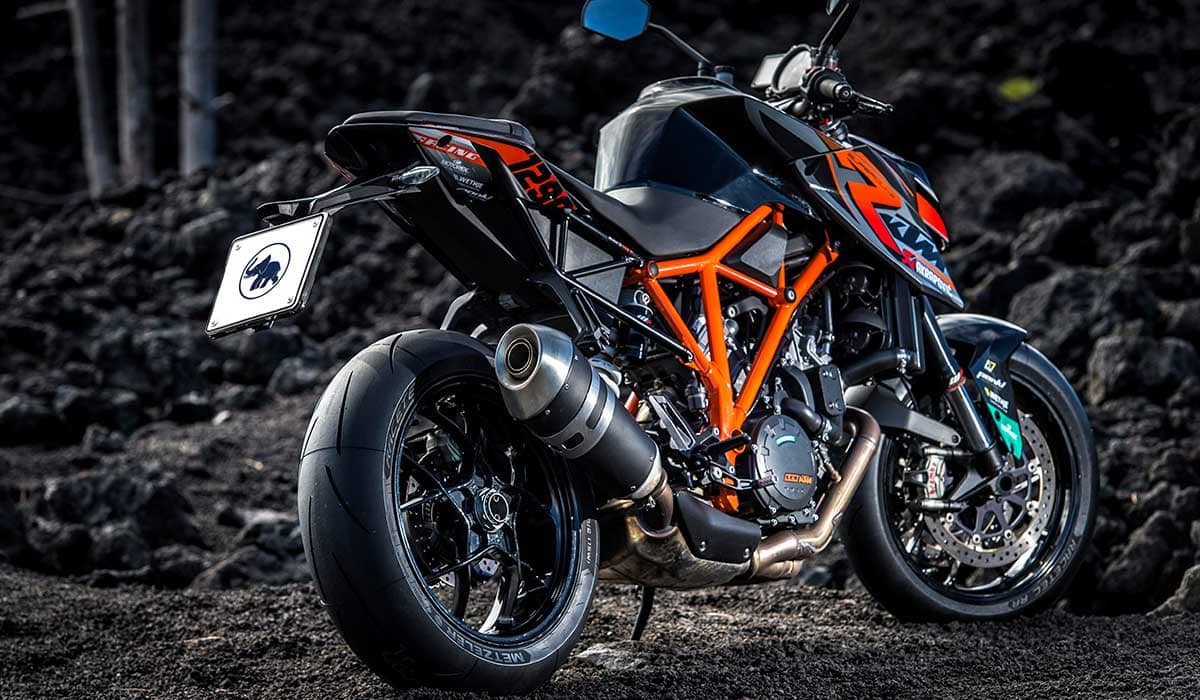
What you might not like
- Warm‑up time is slightly longer than the Michelin or Dunlop. The K3 works in a broad temperature range, but it doesn’t heat up instantly. You’ll need a lap or two before pushing.
- Feedback can feel muted compared to a pure race tire. Some riders prefer more direct communication. If that sounds like you, try the Bridgestone RS11 which delivers sharper feedback.
A versatile road-race tire engineered for both street and track, offering fast warm-up, stable feel in lean, and consistent grip across several sessions.
- Quick warm-up even in cooler conditions
- Neutral and predictable handling at limits
- Wear remains even through aggressive use
- Stable under braking and on uneven asphalt
- Not ideal for cold, damp roads—traction drops
- Outright grip slightly lower than soft race compounds
Verdict
The Racetec RR K3 suits riders who want a dependable tire they can run rain or shine. It’s forgiving enough for less experienced track riders but capable enough to support spirited laps. On road, it offers excellent stability and a comfortable ride.
Continental Race Attack 2 – Grip Without Warmers
Best for riders who ride to the track, run several sessions and ride home again.
Continental’s Race Attack 2 Street (often called ContiRaceAttack 2) stands out for its Black Chili Hypersport compound and absence of shoulder grooves. It provides top‑tier grip without the need for tire warmers and offers predictability at the limit.
Why it’s special
- Black Chili Hypersport compound. This proprietary blend delivers superior grip on road and track surfaces. It warms quickly and remains compliant through multiple sessions.
- No shoulder grooves. By eliminating tread on the shoulders, Continental maximized the contact patch and grip at steep lean angles. Rain performance is still respectable because the central grooves evacuate water.
- Handmade in Germany. Each tire is hand‑built, reflecting Continental’s attention to quality. The carcass construction gives consistent predictability at the limits of traction.
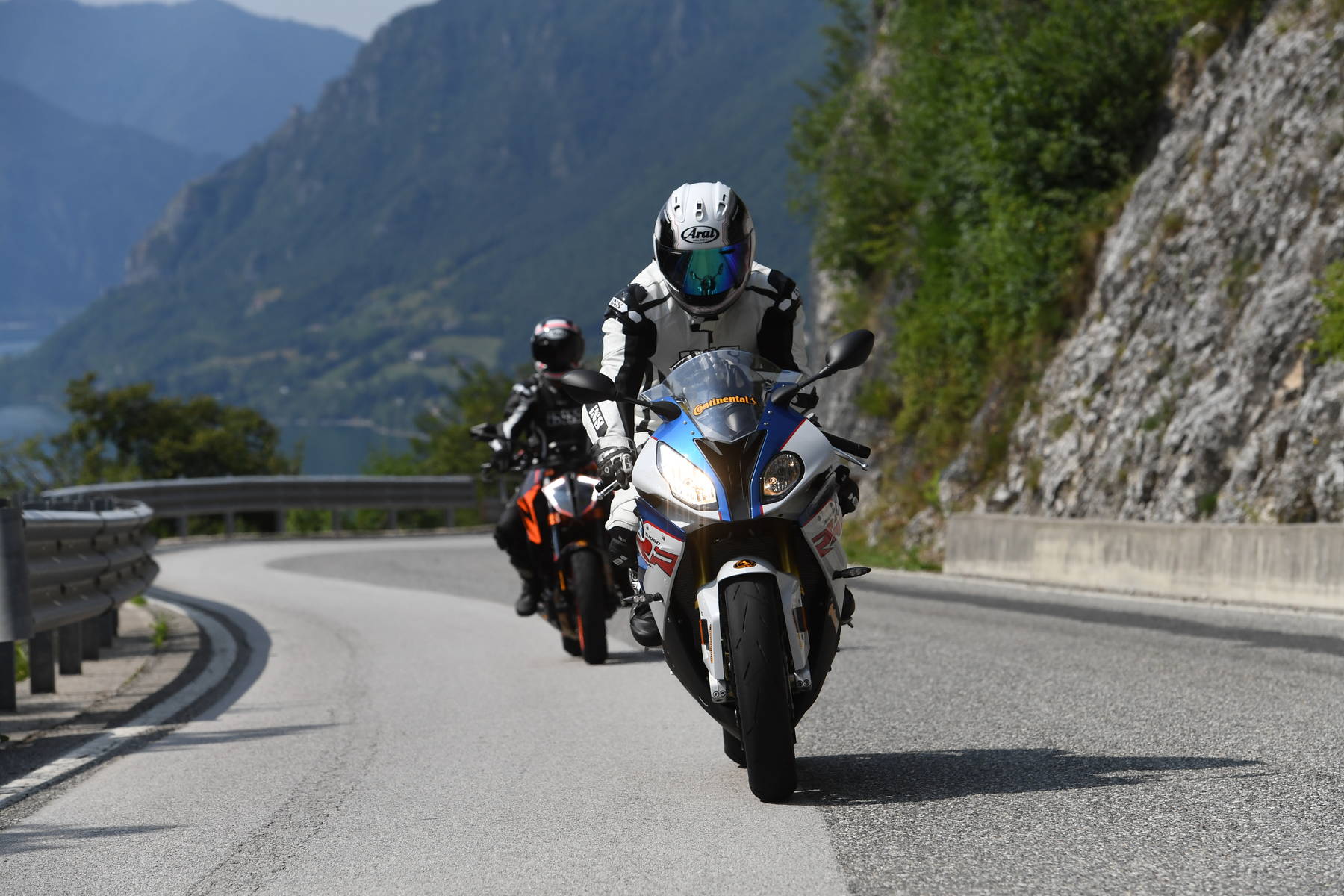
What you might not like
- Less ultimate edge grip than the Pirelli or Bridgestone. The Conti’s focus on predictability means its compound isn’t as aggressive as a pure race tire. If you’re chasing lap records, the Diablo Supercorsa SP or Power Cup 2 may suit you better.
- Limited sizes. Continental offers fewer fitments than larger brands. Make sure they match your rim widths before ordering.
A hypersport track-focused tire that delivers predictable grip, stable feedback, and aggressive lean grip—ready for hot laps while still manageable on the public road.
- Fast warm-up with Continental’s Black Chili compound
- No shoulder grooves maximize grip at steep leans
- Consistent, confidence-inspiring feedback under load
- Good durability for a track-biased tire
- Grip drops off in cold, damp conditions
- Stones and debris can kick up damage on exposed areas
Verdict
Riders love the ContiRaceAttack 2 for its forgiving nature and warm‑up speed. It’s ideal if you ride to the track and don’t have access to warmers. Grip is excellent for most riders, and the predictable breakaway makes it easier to learn limits.
Looking for more Continental options? Check out our Best Dual Sport Tires guide for off‑road oriented models.
Dunlop Q5S Sportmax – Track Feel without the Hassle
Best for riders who want slick‑like performance with minimal setup.
Dunlop’s Q5 series supersedes the beloved Q3+ and Q4, raising the bar for track‑focused street tires. The Q5S is the friendlier version of the Q5: lighter, more compliant and easier to manage on public roads. It’s made in the USA and leverages MotoAmerica race‑tire development.
Why it’s special
- User‑friendly enhancements. Dunlop improved dry and wet grip, tire compliance and warm‑up times. You get more grip sooner and better feel over bumps.
- Race‑derived compounds. The Q5S uses a new race tire–derived compound with superior adhesion. At lean it feels almost like a slick.
- Updated profiles for bigger footprints. Dunlop reshaped the profiles to maintain a larger contact area at extreme lean angles. This yields more grip and less slip without sacrificing quick turn‑in.
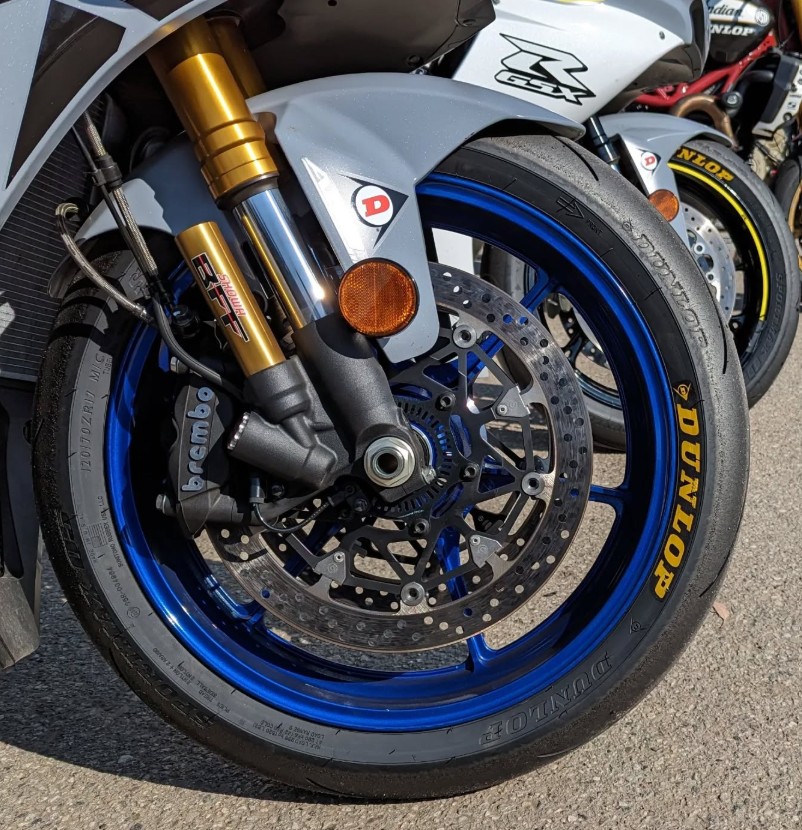
What you might not like
- Slightly heavier steering than the GP 2. The large contact patch gives stability but can slow down flicks from side to side. If you prefer lighter steering, the Power GP 2 might suit you better.
- Can overheat on very hot days. Some aggressive riders report that the rear can get greasy after long stints in high summer temps. Using correct pressures and allowing cool‑down laps helps.
A street-legal tire engineered for track performance, the Q5S gives slick-like edge grip, rapid warm-up, and dependable feedback even after long use.
- Fast warm-up, ready after one lap
- Strong, predictable edge grip at lean
- Good dual-use: track performance plus street durability
- Grip remains consistent even after heavy use
- Rear may degrade in long, hot sessions
- Less confident on cold or wet surfaces
Verdict
The Q5S is an outstanding option for riders who want near‑slick grip without tire warmers. It’s especially good if you ride American tracks where Dunlop’s support is strong. The improvements in wet grip also make it a safer street tire than older Q‑series models.
Bridgestone Battlax RS11 – Hyper‑Sport Precision
Best for riders seeking maximum feedback and outright speed on liter bikes.
Bridgestone’s Battlax RS11 is the flagship hypersport street tire. It descends from the R11 race compound and introduces the V‑MS Belt construction to a road‑legal tire. It is the successor to the RS10 – known for equipping many superbikes from the factory.
Why it’s special
- Aggressive street tire tuned for track performance. The RS11 is Bridgestone’s most aggressive street tire and is designed for riders seeking race‑level performance.
- V‑MS Belt and 3LC construction. The rear tire uses a V‑MS Belt for enhanced temperature control and reduced weight. Its 3LC multi‑compound arrangement provides a hard center for stability and soft shoulders for grip.
- Enhanced shoulder grooves and new groove design. The grooves enlarge the contact patch at extreme lean and improve water dispersion.
- 1.9 seconds per lap faster. Bridgestone’s internal testing shows the RS11 is nearly two seconds quicker per lap than the outgoing RS10, highlighting the improvement in grip and stability.
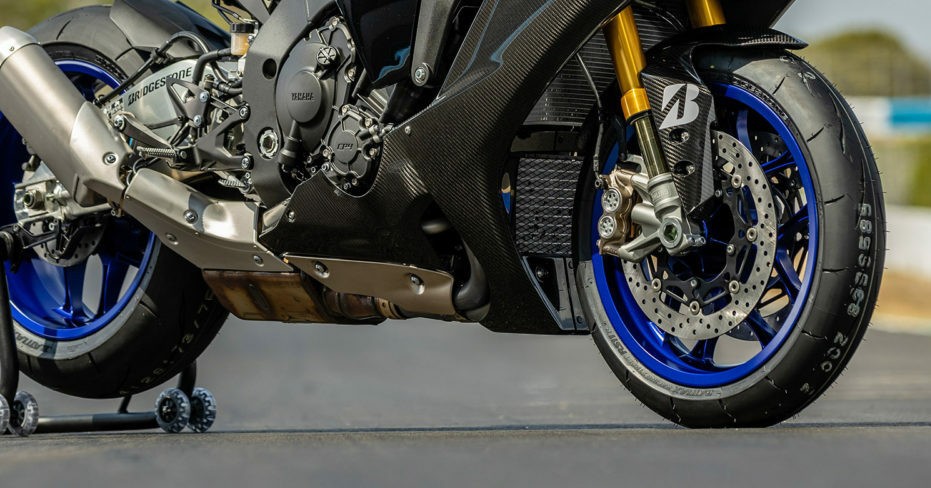
What you might not like
- Requires heat and precise pressures. The RS11 behaves best when properly warmed and pressurized. If you just want to ride to the track and go, the GP 2 or Q5S may be more convenient.
- Pricey and wears quickly. Premium materials come at a cost, and the soft shoulders wear faster than some competitors. Consider it a performance investment rather than a budget choice.
A race-inspired street-legal hypersport tire that maximizes cornering grip, precision feedback, and stability without sacrificing real-world usability.
- Exceptional cornering grip and mid-lean stability
- Direct and communicative feedback under load
- Improved contact patch using V-MS Belt tech
- Reliable feel during hard braking and transitions
- Firmer ride on uneven or rough roads
- Grip declines noticeably as tread wears down
Verdict
The RS11 delivers razor‑sharp feedback and lap time potential for riders who demand the best from their supersport or liter bike. It’s less forgiving than some but rewards skill with astounding grip and stability.
Michelin Power Cup 2 – Almost a Slick, Still Street Legal
Best for experienced riders on liter‑ and open‑class bikes who want a track tire they can technically ride on the street.
The Michelin Power Cup 2 is essentially a treaded version of the Power Slick 2. Designed for 95% track use and only 5% street, it’s aimed at riders who prioritize lap times but don’t want to swap wheels between sessions.
Why it’s special
- Engineered for high‑output machines. The Cup 2 is built for liter‑bikes and open‑class sports machines that put down big torque. Its carcass and tread design handle aggressive brake and throttle inputs without squirm.
- Less than 5% groove ratio. The minimal tread ensures a near‑slick contact patch, yielding superb edge grip.
- Dual‑compound (2CT) and adaptive casing technologies. Michelin’s 2CT and ACT+ technologies provide a robust tread at the center and softer compound at the shoulders for grip, plus ACT+ adaptive casing matches high levels of dry grip with predictable carcass response.
- Designed to work with or without warmers. Warm‑up times are short, but you can still use tire warmers to reach peak grip sooner.
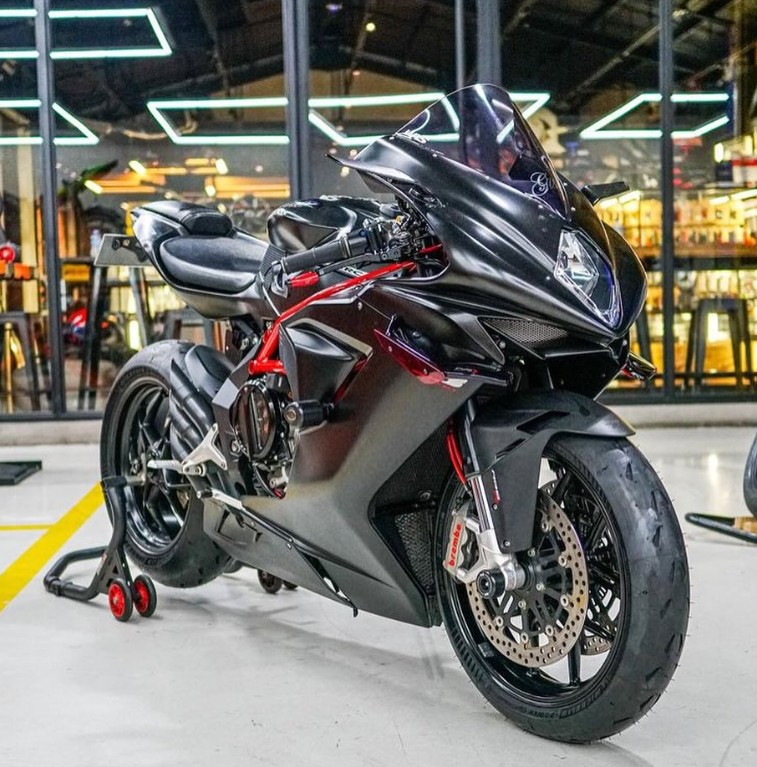
What you might not like
- Marginal wet performance. With only 5% groove ratio, the Cup 2 sheds little water. It’s not a rain tire. For unpredictable weather, the Metzeler K3 or Continental Race Attack 2 may be safer choices.
- Overkill for lower‑powered bikes. Middle‑weight bikes won’t stress this tire enough to justify the price. You’d be better served by the GP 2 or Q5S.
A near-slick, race-level track tire that’s still DOT-legal — it delivers blistering dry grip, sharp feedback, and strong consistency during hard sessions.
- Lightning-fast warm-up even without warmers
- Impressive edge grip at steep lean angles
- Consistent handling even as the tire wears
- Predictable and even wear across sessions
- Limited wet or cold traction when temps fall
- Street mileage is modest — more track than commute
Verdict
If lap times are your focus and you ride a 1000 cc or bigger machine, the Power Cup 2 offers near‑slick performance with the legal convenience of a DOT‑marked tire. It excels under hard braking and delivers incredible edge grip. On the street it demands respect and caution in wet conditions.
Comparison Table
The table below summarizes the key characteristics of each tire. Use it to narrow your choices based on what matters most to you.
| Tire | Notable Traits | Road/Track Balance | Warm‑Up & Setup | Price Range (USD)* |
|---|---|---|---|---|
| Michelin Power GP 2 | 50/50 performance, dual‑compound, MotoGP tech | Balanced | Quick warm‑up, no warmers needed | ~$235–$345 |
| Pirelli Diablo Supercorsa SP V4 | World SBK compounds, FLASH grooves, racing shoulders | 40/60 (street/track) | Requires heat, precise pressure | ~$200–$378 |
| Metzeler Racetec RR K3 | High‑flex polymers, dual‑compound rear, K3 medium | 60/40 | Warm‑up lap required, broad temp range | ~$151–$299 |
| Continental Race Attack 2 | Black Chili compound, no shoulder grooves | 55/45 | Fast warm‑up, no warmers | ~$186–$265 |
| Dunlop Q5S Sportmax | User‑friendly Q5S, race‑derived compounds | 50/50 | Very quick warm‑up, easy pressures | ~$205–$325 |
| Bridgestone Battlax RS11 | V‑MS Belt, 3LC multi‑compound, aggressive | 40/60 | Needs warmers, precise pressures | ~$213–$294 |
| Michelin Power Cup 2 | 95% track, minimal tread, 2CT+ ACT tech | 5/95 (street/track) | Works with or without warmers | ~$249–$328 |
*Prices are approximate U.S. retail ranges on RevZilla as of September 2025.
Buying Guide: How to Choose the Right Track Tire
Choosing a track tire isn’t just about picking the grippiest rubber. Consider these factors before opening your wallet:
Heat Cycle and Warm‑Up
Tires vary in how quickly they reach optimal temperature. If you ride to the track or run short sessions, choose a tire that heats fast without warmers (Michelin Power GP 2, Dunlop Q5S). High‑performance compounds like Pirelli’s SP V4 and Bridgestone’s RS11 excel when warmed with blankets. Running a tire outside its intended temperature window results in reduced grip and premature wear.
Road‑Legal vs. Track‑Only
All tires in this roundup are DOT‑approved, but their street manners differ. The Continental Race Attack 2 and Metzeler K3 handle rain and cool temperatures better than slick‑like options. For primarily street use with occasional track days, lean toward 50/50 designs. The Michelin Power Cup 2 is essentially a track tire with just enough tread to be legal; treat it as such.
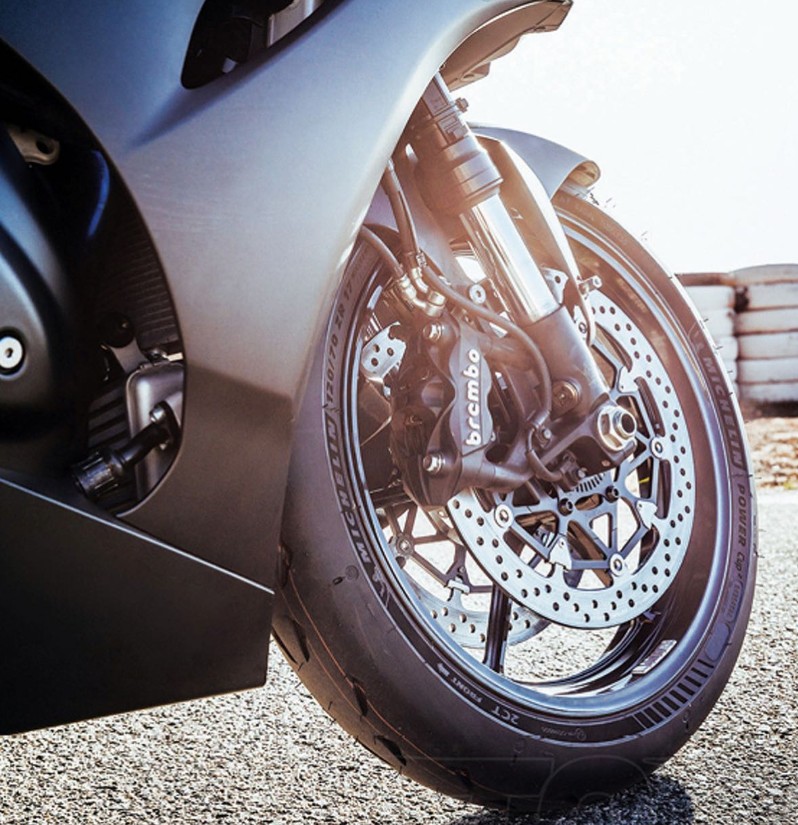
Bike Size and Power
Larger bikes generate more heat and stress tires more. Tires like the Power Cup 2 and RS11 have stiffer carcasses and dual compounds to handle big power. On middle‑weight bikes they may not reach operating temperature, resulting in poor grip. The GP 2, Q5S and Race Attack 2 suit lighter machines better.
Tread Life and Cost
Track tires wear faster than street rubber. Racing compounds like the Supercorsa SP and RS11 deliver incredible grip but last only a handful of track days. The Metzeler K3 and Continental Race Attack 2 trade a bit of ultimate grip for longer life. Budget for replacements and consider the total cost of track days (tires, fuel, fees) when choosing premium rubber.
Personal Preference
Tire feel is subjective. Some riders like the telepathic feedback of the Bridgestone RS11, while others prefer the more forgiving nature of the Continental or Dunlop. If possible, try different brands at track‑day vendor booths. Pay attention to turn‑in effort, mid‑corner stability and how the tire communicates slip. There’s no single “best” tire – only the best one for you.
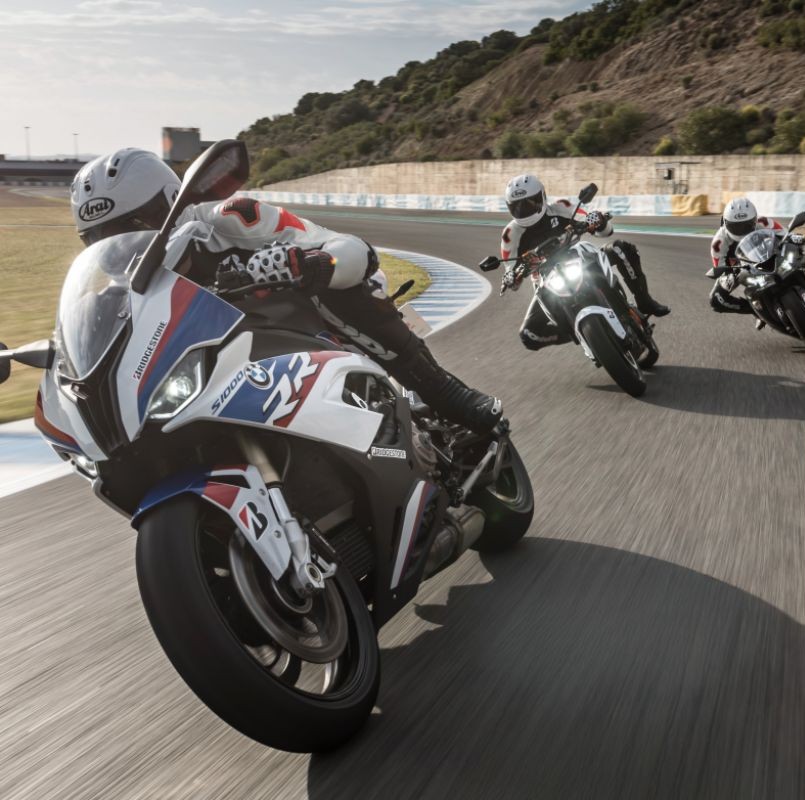
Final Thoughts
Track tires have evolved dramatically. Today’s street‑legal race rubber offers grip levels that were pro‑only a decade ago, with compounds that warm quickly and last more than a single session. Whether you’re a weekend warrior chasing personal bests or a commuter who sneaks in occasional track days, there’s a tire here to elevate your riding.
Remember, your tire choice dictates not just lap times but also confidence, safety and enjoyment. Invest wisely, check pressures meticulously and don’t be afraid to experiment.
See you in the pits!
Related
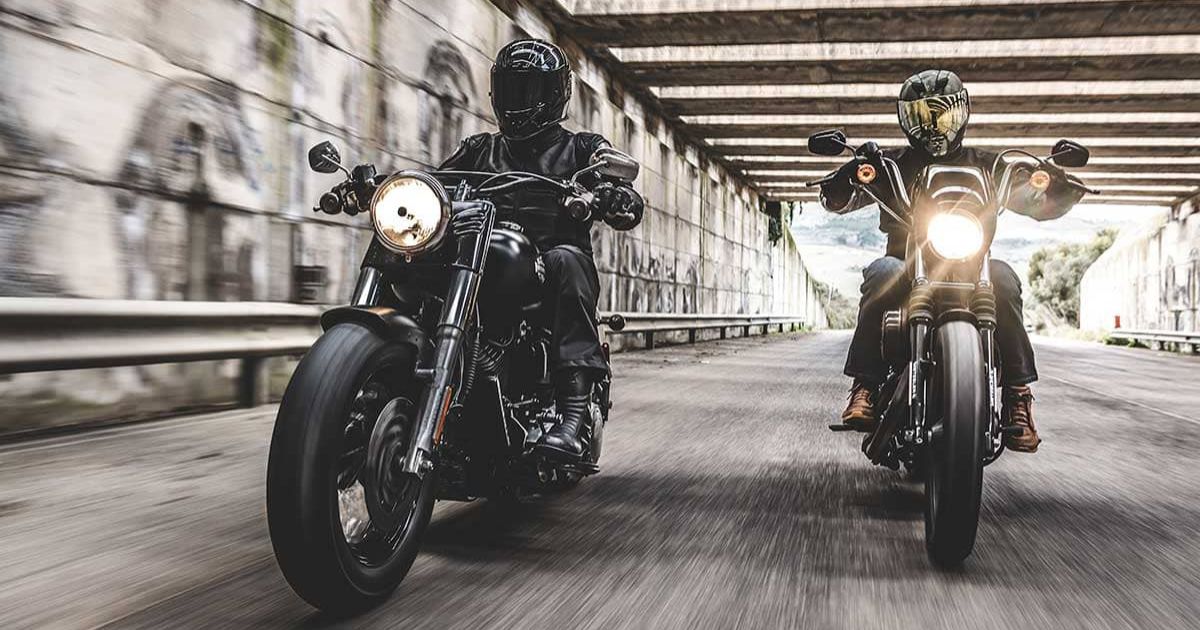
Best Cruiser Tires for Motorcycle Riders in 2025
Discover the best cruiser tires of 2025 for riders—tested for grip, comfort, mileage, and style to keep your V-Twin planted and confident.

